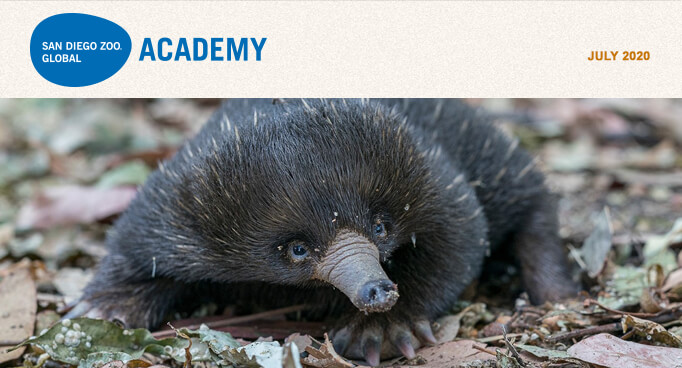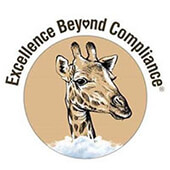 |
Accomplishing a Major Training Initiative at SDZG: A Case Study of Diligence
By Laura Martella
When San Diego Zoo Global (SDZG) closed its Zoo and Safari Park operations to the public on March 16, 2020, due to the COVID-19 pandemic, it was a shocking reality. This organization has never experienced such a shut down in its 103 years, and the impact will be felt for years to come. Even though the organization was closed to the public, it never stopped operating; the care of the animals, plants, and people continued to be the number one priority, along with securing the facilities and keeping essential staff protected and secure during this time.
These were, and continue to be, challenging times for the organization's leadership teams. The commitment by the SDZG executive team to focus on keeping operations going came at a tremendous expense. However, this did not stop our leadership teams from focusing forward, and preparations were underway from the beginning to reopen. Reopening plans were put into place and adjusted with every update from the California Department of Public Health (CDPH).
Following federal and state guidelines, including guidelines from the California Department of Public Health, SDZG took a proactive approach in its steps to follow all protocols as outlined in COVID-19 Industry Guidance: Museums, Galleries, Zoos, and Aquariums. This included a written workplace plan, prevention practices, health and safety policies, and training and communication with employees (as well as contractors who work on Zoo and Safari Park grounds). It was the training requirement that spurred the formation of a special team within SDZG to assess the need. This included developing the curriculum, deploying the assigned training, implementing communication strategies, and tracking the required training in order to be compliant with the California Department of Public Health guidelines in the COVID-19 Resilience Roadmap.
The team set out to accomplish the task of creating a training program, delivering it to over 2,500 individuals who work in and around the organization, and tracking it to ensure compliance. What started as a "can we do this quickly?" in the middle of May 2020, turned into an online training program that was delivered within a short time frame—less than 30 days! This accomplishment could not have been achieved without this dedicated team focusing on creating an informative and educational training program, and delivering it on time to meet the goal of compliance with California state requirements. It was certainly a case of diligence. There were four critical components to making this happen.
#1) SDZG Executive Leadership Team: It was the commitment, support, and encouragement from these leaders that empowered the team to develop a training program that would deliver an educational and informative message—one that would resonate with everyone working in the organization. The executives of the organization were transparent in their communication, and visible to employees through weekly video messages, which reinforced the values of San Diego Zoo Global. Shawn Dixon, chief operating officer, envisioned early on that SDZG's My Academy would be the ideal place to do this training.
#2) Collaborative Partner CypherWorx: San Diego Zoo Global's internal learning management system is My Academy. We enlisted our Academy partner, CypherWorx. They immediately made this a priority project, and added their own experts to work with our team members from risk management, vision and innovation, and communications. This is an example of great collaboration, as CypherWorx, with a sense of urgency, made tremendous efforts to ensure that we would have a great training course in the necessary time frame.
#3) Effective Communication Strategy and Messaging: Having a team dedicated to messaging and building a communication strategy around this training was done flawlessly, due to the efforts of Christina Simmons, associate director of mission communications; Eryn De Leon, manager of internal communications; and Robin Keith, associate director of vision, innovation, and strategy. The messaging was clear and interactive, and Frequently Asked Questions (FAQ) were created to assist in the implementation of the training.
#4) Dedicated Department Leaders: Our organization's department leaders rose to our training challenge. They navigated through their employees' varying shifts, part-time and flexible schedules, remote work schedules, and hundreds of team members being recalled from furlough, to ensure training was completed in a timely manner. Keeping track of all these moving pieces was quite a challenge, but there was not one complaint about the process. Department leaders in every single department within San Diego Zoo Global just got it done! Whether the training was done online via My Academy or in person (instructor-led training), these leaders were diligent in their efforts to accomplish this task.
It has truly been a pleasure being involved with this project—seeing this organization's dedication to putting a team together, working with CypherWorx, creating a training program, and delivering it to over 2,500 employees and contractors, all in less than 30 days.
For more information regarding this article, please contact Laura Martella, director of leadership and employee development at San Diego Zoo Global, at lmartella@sandiegozoo.org.
Customize a course for your operations in 2020: please contact us if we can assist with your training efforts in this challenging year.
For more information about customized course creation, please contact Linda Duca, CypherWorx, at lduca@cypherworx.com. |
Academy News
 The San Diego Zoo Global Academy Puts Cabrillo High School Aquarium in the Spotlight The San Diego Zoo Global Academy Puts Cabrillo High School Aquarium in the Spotlight
The Cabrillo High School Aquarium in Lompoc, California is part of the Academy's collaborative learning environment!
Cabrillo High School Aquarium Shares Their Plan to Use Academy Courses
The Cabrillo High School Aquarium has worked since 1986 to promote stewardship of the oceans through a student-run, cross-curricular, project-based learning environment. The Aquarium welcomes over 7,000 visitors annually, free of charge. Its 6,000-square-foot facility features more than two dozen live and static displays, maintained and hosted by six classes of public high school students. Please click here to watch a brief video on the program, produced by PBS station KVIE.
Aquarium advisors and students are excited to use the online San Diego Zoo Global Academy in the upcoming school year, to supplement instruction on animal welfare, husbandry, interpretation, and conservation; as well as utilize the platform to develop program-specific courses. The extensive course catalog will be a valuable resource for student curators and tour guides during what is sure to be a uniquely challenging school year.
Implementing the online Academy courses should result in consistently high levels of proficiency across all classes, regardless of whether they are in a traditional classroom environment or via distance learning. The motto of the Cabrillo High School Aquarium is "A Partnership with the Earth," and this newest partnership with the San Diego Zoo Global Academy is certain to help Aquarium advisors and students continue to grow their unique program!
For more information, visit the Cabrillo High School Aquarium website: cabrilloaquarium.org.
 Administrator's Users Group Webinar Administrator's Users Group Webinar
Please join us for the Administrator's Users Group Webinar, hosted by Academy partner CypherWorx. The next webinar is Friday, July 17, at 11 a.m. PDT.
Register here
After registering, you will receive a confirmation email containing information about joining the webinar. |
Academy Contributors

Getting Better All the Time
Providing Good "Insurance" for the Animals in Zoological Organization Care—Through the Latest Animal Welfare Act Developments and Guidance
By James F. Gesualdi
To keep ahead, each one of us, no matter what our task, must search for new and better methods—for even that which we now do well must be done better tomorrow.
—James F. Bell
There is always something new to know, understand, and apply concerning the Animal Welfare Act.
The US Animal Welfare Act (AWA) is periodically amended, and new regulations implementing portions of the AWA are issued from time to time, and changes relating to the AWA are constantly arising. These changes come in the form of informal agency guidance, evolving interpretations, improving practices, critiques, public concerns, and other means. Decades have been invested in following and building upon the practical applications of these changes, and this Getting Better All the Time column has become a regular opportunity to share information on these and other changes, and how we can best use them to become better animal caregivers. Your sound investment of a small amount of your time in reading the column and the enewsletter is well spent. With respect to the AWA, your continued personal and professional development is a form of "regulatory-compliance insurance."
Birds will be better protected through forthcoming AWA regulations, with standards for their humane care and treatment.
Birds have long been covered under the AWA, but have never been regulated with standards specifically tailored to their care and treatment. For years, there have been efforts, including litigation, to change that, and to compel the agency to develop and enforce bird-specific regulations. (Some, including this author, have long thought that birds could be handled, at least preliminarily, through the broad catch-all standards governing other warm-blooded animals.) In June 2020, it was reported with respect to a settlement of one such lawsuit that the U.S. Department of Agriculture's Animal and Plant Health Inspection Service Animal Care Unit will be developing and issuing AWA regulations for birds.
This is good news for birds, in that they are getting the legal and regulatory attention worthy of their high-flying nature. It is good news as well for Excellence Beyond Compliance® practitioners, as one of the fundamental building blocks of the program is that the "EBC" approach has us extend our efforts, including AWA-like standards and the animal welfare program, to include all resident animal species. This means that zoological organizations already doing good things for birds may have some worthwhile experiences to contribute to the discussion of the anticipated regulations. It also demonstrates that consistently going above and beyond and doing the right thing by the animals in our care makes us better prepared for change, and more resilient. That is a priceless form of "change-for-the-future insurance."
Bookmark the agency website, and make it a practice to check it periodically.
A good way to help yourself to stay up to date, dig deeper into agency informational resources, and look for items of newfound interest or importance to your organization is to simply check the agency website from time to time: https://www.aphis.usda.gov/aphis/ourfocus/animalwelfare. Do that, and take a relaxed scroll through its contents. Recently doing just that showed that the agency had completed a comprehensive update of the website in early June 2020, and that there were new items, including some reported here, worthy of sharing. This is a good form of "staying-current-with-agency-thinking insurance."
New agency Animal Care Aids for daily observation, public feeding, and drive-through parks.
In addition to the agency's Animal Welfare Inspection Guide, Tech Notes, and other Animal Care Aids previously noted in this column, here are some new ones, dated May 2020 and recently posted online. These Animal Care Aids provide agency suggestions for situations relevant to some or all zoological organizations. Please give them thoughtful consideration, and see if any make sense for your animals and facilities. Feel free to reach out to your inspector if you have additional suggestions for these topics.
Daily Observations: Behavior—Importance of understanding and observing normal and abnormal behavior relating to play, rest, socialization, eating, and drinking, as a means of assessing and addressing animal well-being.
https://www.aphis.usda.gov/animal_welfare/downloads/gencare/acaid-gencare-daily-observation-behavior.pdf
Daily Observations: Physical Health—Monitoring and confirming signs of healthy animals, and early detection and treatment of unhealthy signs relating to eyes, ears, nose, mouth, skin, hair, body condition, limbs, and elimination.
https://www.aphis.usda.gov/animal_welfare/downloads/gencare/acaid-gencare-daily-observation-physical.pdf
Public Feeding of Animals in Petting Zoos and Other Settings—Even though these programs may be inactive during the pandemic, every responsible zoological organization with any such activities anticipated should review this immediately, and use it to evaluate the public safety and animal welfare aspects of your programs as to the proper foods, appropriate quantities of food, public instructions, feeding records, body condition assessments, weight records, and animal behavior and management.
https://www.aphis.usda.gov/animal_welfare/downloads/gencare/acaid-gencare-public-feeding.pdf
Tips for Shelter and Housing at Drive-through Animal Parks—Reviewing this suggests applicability broader than drive-through parks, with respect to types and numbers of shelters, safety of the structures, relevant weather conditions, environmental considerations, and hazards.
https://www.aphis.usda.gov/animal_welfare/downloads/gencare/acaid-gencare-drivethrough-sheltering-tips.pdf
Managing Animals and Veterinary Care at Drive-through Parks—This one may also have broader applicability, offering insights on staffing, training, equipment, animal training, monitoring, and reporting, as well as preventative care.
https://www.aphis.usda.gov/animal_welfare/downloads/gencare/acaid-gencare-vetcare.pdf
Familiarizing yourself and your staff with these resources and factoring them into your daily practices and facilities—even if just to confirm or validate the appropriate current approaches and conditions—is a form of "animal-and-veterinary-care-and-facility insurance."
Exploring, learning, and applying these AWA-related lessons is truly an essential part of every zoological organization's "insurance program."
Studying these things together and participating in the larger San Diego Zoo Global Academy effort helps each of us, and our responsible zoological organizations, identify items worthy of our attention, and to be better in many ways. It is a highly "proactive form of insurance," greatly benefitting the lives and well-being of the animals in our care. The goodness of our work is greatest when we best serve the animals we love and respect, because that is what we are meant to do with our precious and fleeting days.
In order to help you be your best in making animals' lives better, below is a link to the Animal Caregivers' Check Sheet of Essential Resources to Advance Animal Welfare.
Animal Caregivers' Check Sheet
© 2020 James F. Gesualdi, P.C. The opinions expressed herein are solely those of the author. This is not, nor should it be construed as, legal advice.
For more information on EXCELLENCE BEYOND COMPLIANCE® see http://excellencebeyondcompliance.com/.
More About James F. Gesualdi
The San Diego Zoo Global Academy is pleased to share a link to an ABA Journal article about Academy columnist James F. Gesualdi, written by Amanda Robert:
A Love of Dolphins Sparked Lawyer's 30-year Crusade to Improve Well-being of Animals. |

|